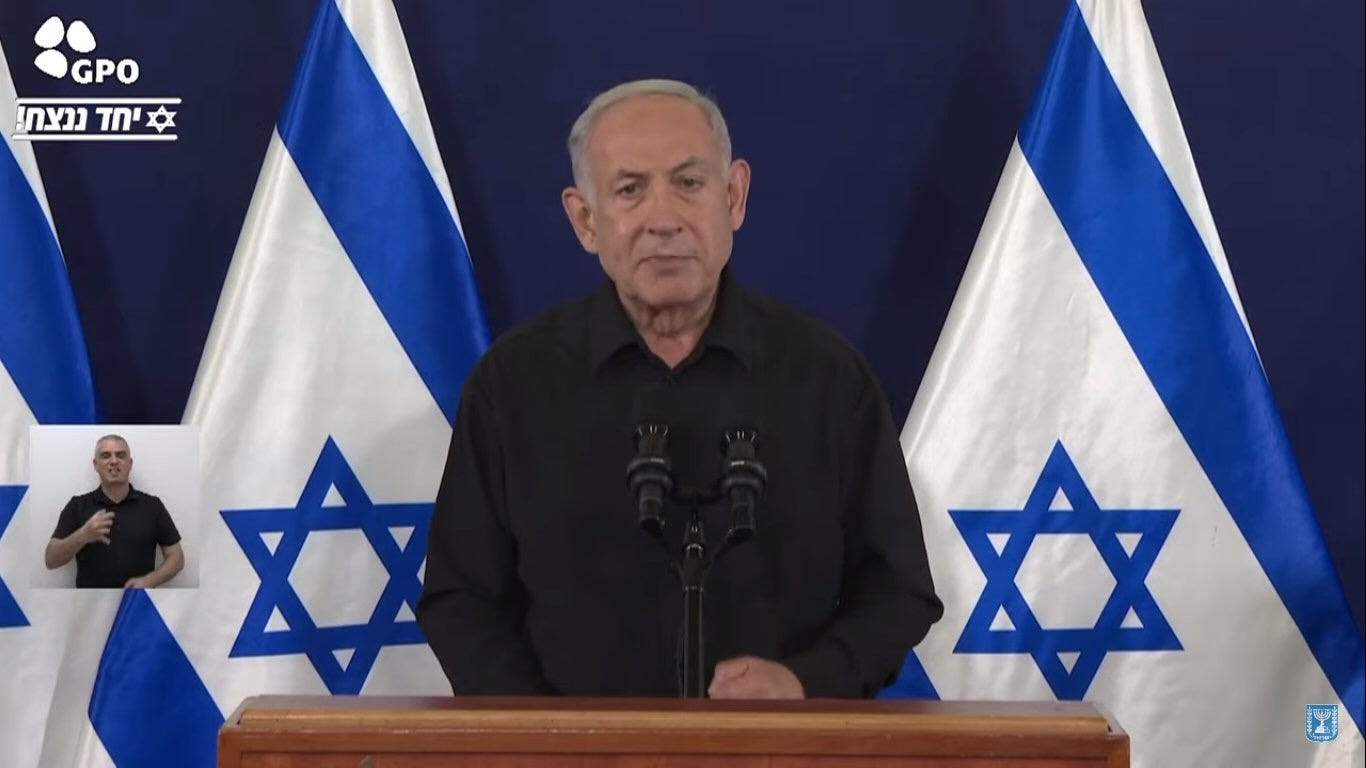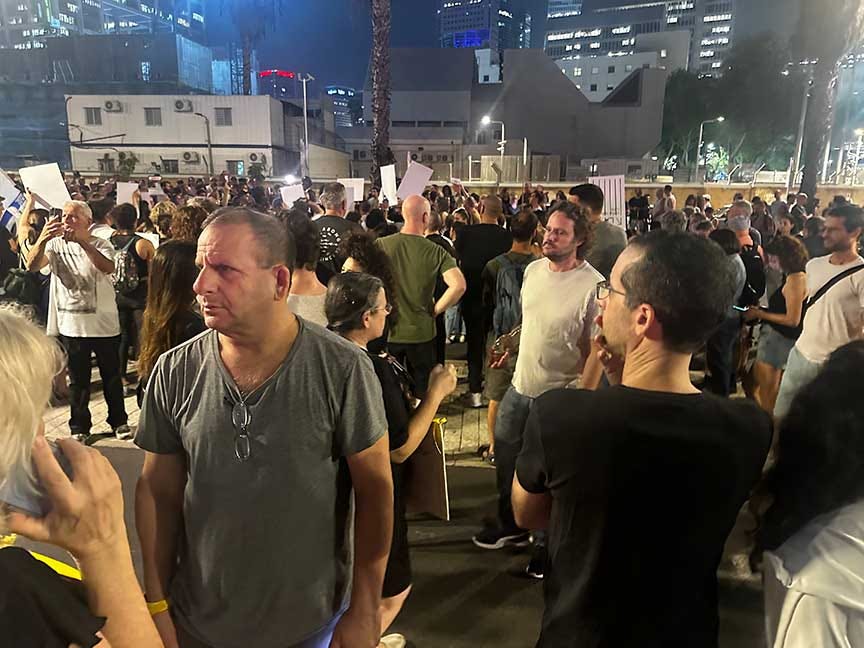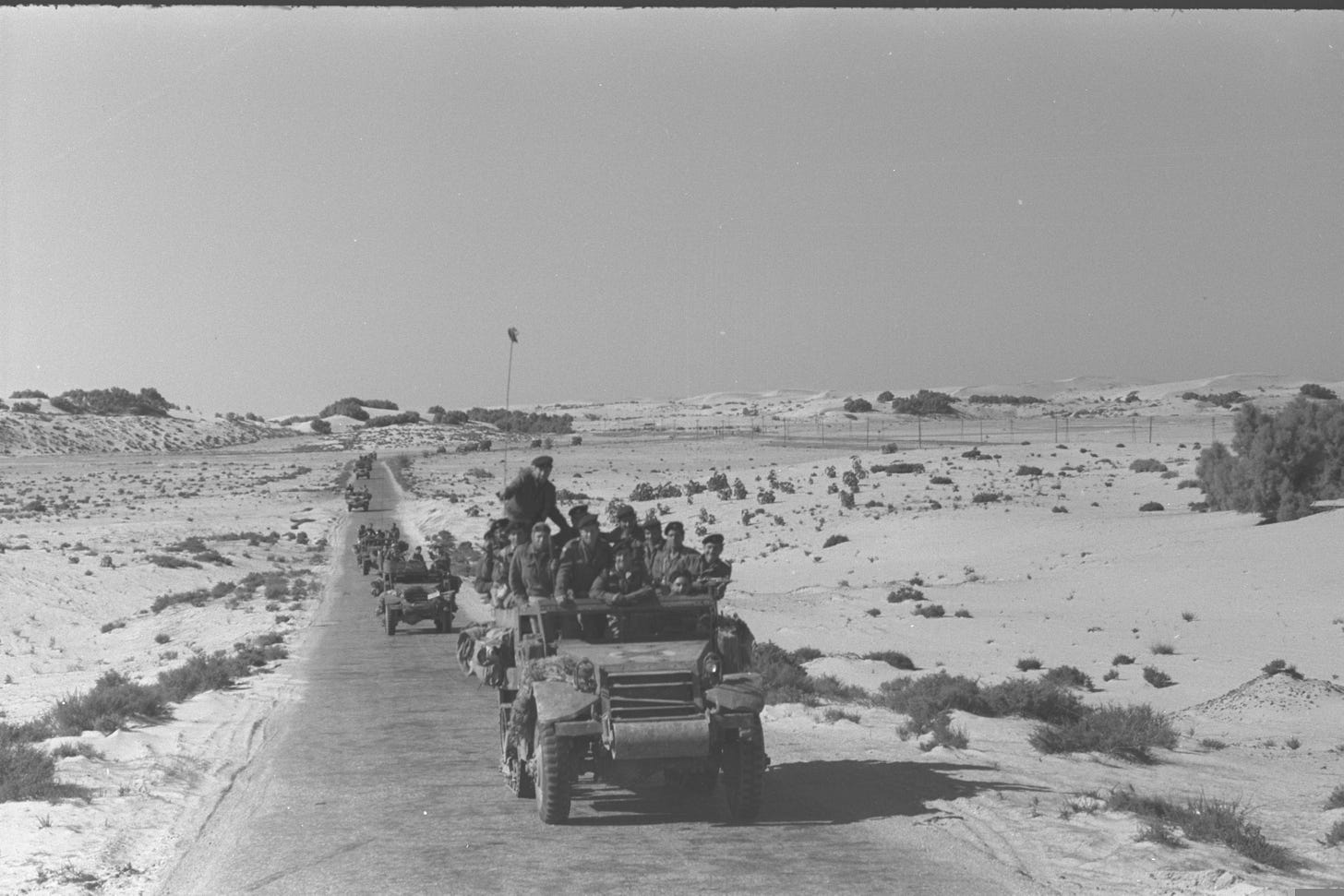DAY 22 OF THE GAZA WAR: Ground War Begins, Rockets on Tel Aviv, Hostage Relatives Protest
Tel Aviv Diary October 28, 2023
Yesterday, what seemed like Tel Aviv slow return to normalcy came to an abrupt halt. In the early afternoon, a rocket attack targeted the country’s central region. One of the rockets was not intercepted by the Iron Dome and directly hit a building in South Tel Aviv. Four people were wounded in that attack, although none seriously. However, the fact that a building in Tel Aviv was hit altered the mood in the city. There had been a sense that residents in the center of the country were protected, but that was suddenly no longer the case.
The Home Front Command had announced (apparently prematurely) that the Tel Aviv area was considered “green,” and schools were authorized to open as usual. After the rocket attack, Tel Aviv Mayor Huldai stated that only schools that possess a secure area large enough for all students and staff would be permitted to open on Sunday.
Today, three missile barrages targeted the Tel Aviv area; only one was directed at my section of the city. As I was one caught me outside near a local restaurant during that barrage, I followed the people sitting outside the restaurant into a building around the corner. A minute later, the booms began; some of them were the interceptions of 15 rockets. Two rockets managed to get through the iron dome: one striking a parking lot in Kiryat Ono, and the second hitting a street in Holon. In both cases, no one was injured.
After tonight's barrages, the Home Front Command revised their orders for the Tel Aviv area, rescinding the city’s green certification. Schools and work can now only take place in areas that contain secure rooms for all workers or students.
On both Wednesday and Thursday nights, the Israel initiated small-scale raids on Gaza conducted by IDF land forces, as well as by Israeli frogmen. On Friday night, a more significant force entered Northern Gaza. The attack was preceded by a massive air and ground bombardment. As part of the attack, internet and phone services for all of Gaza were interrupted.
The depth to which Israeli forces have penetrated is unclear, but the strategy appears to involve using overwhelming force to advance slowly, thereby limiting our casualties and giving Gaza civilians a chance to move away. So far, the strategy seems to be effective in the most critical aspect: Israel suffered no casualties on the first day of the attack. My expectation is that we will see a slow advance every night. Tonight, the Air Force has already begun massive bombing, most likely in preparation for the forward movement of ground forces.
In the North, several rockets and missiles were fired at Israeli targets. Those barrages were met with Israeli counter-fire. These attacks resulted in no Israeli casualties. Hezbollah’s attacks in the North appear to be continuing at the same rate as the previous days of limited conflict.
Tonight, for the first time, Prime Minister Netanyahu, Defense Minister Galant, and Former Defense Minister Galant gave a joint press conference. The press conference was filled with cliches that have already been uttered repeatedly. Netanyahu stated,
The IDF is totally committed to protecting our country after the atrocities. The mission is to defeat the enemy. The fighting in Gaza will be long and difficult. This is our second war of independence.
Tonight was the first time Netanyahu has taken questions from the press in years. When pressured about whether he was taking personal responsibility, Netanyahu once again prevaricated, insisting that everything would be examined, including his role
.
Netanyahu went on to proclaim that his current job was “to save Israel.” When asked about the competing interests of securing the release of all hostages, versus crushing Hamas, Netanyahu said the two were not mutually exclusive. When questioned whether Israel would agree to refrain from eliminating Hamas in return for their releasing the hostages, Netanyahu gave a clear answer: No.
Earlier, the IDF Chief of Staff stated in order to achieve the goal of the war “there was no choice but to launch a land attack.”
Tonight, there was another large demonstration held by families of the hostages, after meeting with Netanyahu. They were joined by a few thousand others. I spoke to several people there to understand why they had gathered to protest. Despite chants in the crowd demanding the immediate return of the hostages, most seemed to understand that this was unlikely. People came out, as they told me, to show solidarity. One family said their son was serving in the army near or in Gaza; they didn't know what else to do and felt that showing support for the hostages was the best action they could take
.
•••∞•••
DATES AND CASUALTIES SUFFERED IN PREVIOUS ISRAELI WARS
ARAB-ISRAELI WAR (1947-1949)
Dates: November 29 194 – March 10, 1949
Israeli Casualties: 6,373 killed
SUEZ CRISIS (1956)
Dates: October 29, 1956 – March 1957
Israeli Casualties: 231 killed
SIX-DAY WAR (1967)
Dates: June 5, 1967 – June 10, 1967
Israeli Casualties: 776 killed
WAR OF ATTRITION (1967-1970)
Dates: July 1, 1967 – August 7, 1970
Israeli Casualties: 1,424 killed
YOM KIPPUR WAR (1973)
Dates: October 6, 1973 – October 25, 1973
Israeli Casualties: 2,656 killed
FIRST LEBANON WAR (1982)
Dates: June 6, 1982 – September 1982
Israeli Casualties: 675 killed
• It should be noted that the a low intensity war continued in Lebanon until the Israeli withdrawal to the border in 2000.
FIRST INTIFADA (1987-1993)
Dates: December 9, 1987 – September 13, 1993
Israeli Casualties: 277 killed
SECOND INTIFADA (2000-2005)
Dates: September 28, 2000 – February 8, 2005
Israeli Casualties: 1,053 killed
SECOND LEBANON WAR (2006)
Dates: July 12, 2006 – August 14, 2006
Israeli Casualties: 165 killed
GAZA WAR (2008-2009)
Dates: December 27, 2008 – January 18, 2009
Israeli Casualties: 13 killed
ISRAEL-GAZA CONFLICT (2014)
Dates: July 8, 2014 – August 26, 2014
Israeli Casualties: 73 killed









While extremely sad, and distressing to see the losses over the losses over the years a breakdown of civilian versus military casualties, as well as presentation of Arab/Palestinian casualties would paint a much clearer picture of the tragic loss of life.
It truly is sad to see the losses of Israelis over the years, I find it hard to understand how a country can continue on in this fashion. I am also shocked at how the UN addressed these issues. Can they not see that the country of Israel has been under attack for decades????